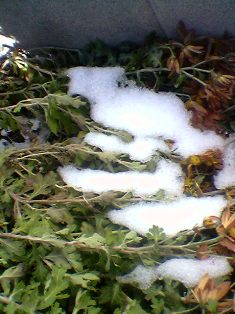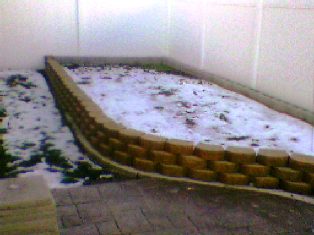 Winter has settled in where I live and the ground is still covered with a blanket of snow in some spots. In the spots where the sun has kissed the earth, dormant plants and grass peek up with none of their lively splendor. They are sleeping now and, in the places where there are bulbs, there are a few plant tags to mark the springtime emergence of color. As I look around, seeing the hint of life burgeoning in the ground, I am reminded of a conversation I recently had with my friend, Jen Halterman.
Winter has settled in where I live and the ground is still covered with a blanket of snow in some spots. In the spots where the sun has kissed the earth, dormant plants and grass peek up with none of their lively splendor. They are sleeping now and, in the places where there are bulbs, there are a few plant tags to mark the springtime emergence of color. As I look around, seeing the hint of life burgeoning in the ground, I am reminded of a conversation I recently had with my friend, Jen Halterman.One day, Jen and I were in the middle of an "issue" and she said, "Angie, have you sourced this?"
My brain knows the meaning of source: the beginning, where it all starts. So, when anybody asks me to "source", I do just that - go back to the beginning. When I get to where "it" all began, I acknowledge it, saying, so THAT is where this all started. Hmmm. Then I sit there for a bit, reviewing the memories and then I say, Okay. Sooooo... this is where it started. It's in the past. It is what was. Now what???
 I don't experience animosity or anger or blame. Instead, I experience acceptance of what happened then and can see how it presently plays out in my life. And, because it was in the past, I believed I couldn't change it. It had happened and that was a fact and I wouldn't know what else to do, so I just accepted it and went forward having no idea what I was supposed to do about the source. I've done this for almost a decade, this 'sourcing the issue.' The result of this is that I've now got hundreds of open sources and no resolve. No wonder I'm tired!
I don't experience animosity or anger or blame. Instead, I experience acceptance of what happened then and can see how it presently plays out in my life. And, because it was in the past, I believed I couldn't change it. It had happened and that was a fact and I wouldn't know what else to do, so I just accepted it and went forward having no idea what I was supposed to do about the source. I've done this for almost a decade, this 'sourcing the issue.' The result of this is that I've now got hundreds of open sources and no resolve. No wonder I'm tired!So when she asked me that, I felt indignant and snappy. "Of course I have, Jen! Of course I've sourced it. Of course I've discovered the beginning. I know these skills! I always 'source' whatever comes up from me. So what. I've. Sourced. It."
There was a lengthy pause from her end and she tentatively said, "You found the beginning and then what did you do?"
"What do you mean, 'and then what'??? There is no 'and then what'! I found the beginning and recognized it and accepted it. That's what 'sourcing' is."
Her silence told me there was something I was missing. She waited and waited and so did I. In frustration, I said, "Jen, tell me what I'm missing. What does 'sourcing' mean to you? Why is 'sourcing' beneficial? All it does is open up the beginning and leave me with more crap to carry."
 She said, "Well, I see 'sourcing' as going to the root of the pattern, seeing if it's something I want to hold onto or if it's something I want to release and, if it is, then choose something new going forward."
She said, "Well, I see 'sourcing' as going to the root of the pattern, seeing if it's something I want to hold onto or if it's something I want to release and, if it is, then choose something new going forward."She said one sentence, the word "root" catching my attention and suddenly I was in the middle of a huge paradigm shift. After all these years, I realized that 'sourcing' was not merely going back to the beginning. More importantly, it was recognizing the beginning of the pattern and then releasing it so that I can decide what I want to do from that point forward. Granted, I cannot change what was, but I can decide to create a new pattern after I recognize the old, destructive one.
In every garden there are beneficial plants and there are also weeds. To have a productive garden, it's important to know the difference and keep the plot clear of the weeds. If you've ever worked with a garden or flower bed, then you are familiar with the fact that many specimens of weeds have root systems that are seemingly unstoppable and to get the plant completely out of the ground, it takes some doing. With patience, diligence and some strength, I have the power to uproot the weed - no matter how menacing its root system is - and replace it with the seeds of a more beneficial plant.
 The same goes for an insidious, destructive pattern. When I find the root of my pattern, I can uproot it and replace it with a more supportive belief structure. I have the power to create a beautiful life and I feel grateful to have discovered that the weeds in my garden can be removed, if I so choose.
The same goes for an insidious, destructive pattern. When I find the root of my pattern, I can uproot it and replace it with a more supportive belief structure. I have the power to create a beautiful life and I feel grateful to have discovered that the weeds in my garden can be removed, if I so choose.How does your garden look?
© Angie K. Millgate 11/29/09

No comments:
Post a Comment